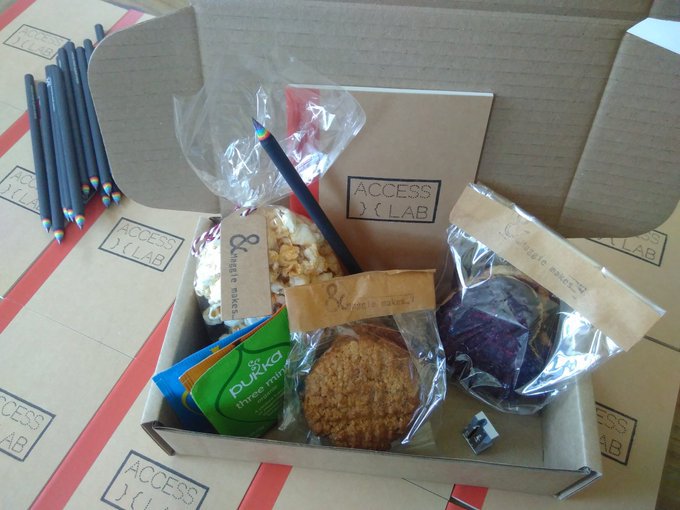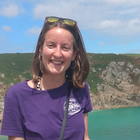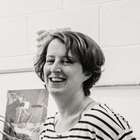AccessLab pandemic style
Posted June 16, 2020 by Amber GriffithsTogether with Falmouth Library, we were lucky enough to get funding for a new series of AccessLab workshops from the Engaging Libraries scheme (run by the Wellcome Trust, Carnegie UK and Wolfson Foundation). The AccessLab project is about broadening access to scientific evidence. We do this through pairing scientific researchers with people who are seeking reliable information for their work or personal lives. Our focus is on developing skills for finding scientific information and judging its reliability, rather than just transferring subject-specific knowledge.
The original plan was to run three workshops (June 2020, Nov 2020 and Jan 2021), with the first led by FoAM, the second led jointly, and the final one led by Falmouth Library, adjusting the format as we go so we end up with something that the library are confident running.
After a bit of negotiation the funders agreed to allow us to keep to the original timeline and move the first workshop online. This is something we’ve wanted to do for ages, so it felt like a valuable opportunity. There are clear benefits to running these events online – it makes it easier for people to participate who have caring responsibilities, health problems, disabilities, social anxieties, or a lack of transport for example. It also reduces the participant transport and so the carbon impact of running an event. To counter all the good things, there are of course major digital exclusion issues to consider for online events, especially in Cornwall where about 13% of people have never used the internet.
One of the reasons we were keen to try running AccessLab online was that it would force us to hone the format into one that would potentially be easier for others to run. It also gives us more experience developing a quite complex workshop for online delivery, which is something that we want to do more of.
The AccessLab workshops consist of two parts – firstly a prep session just for researcher participants, and then a full day workshop for researcher and other community participants. Below are the changes we made to make it work online, and some things that worked/didn’t:
- We weren’t happy with the standard online software for running events – most is proprietary and has security and privacy issues. We installed Big Blue Button on a dedicated FoAM server as it is open source and has ideal functionality for online teaching. However, following tests and advice from colleagues at a university who had tried the same, we decided that unfortunately we couldn’t risk using it for these events – it works brilliantly with small numbers but starts to falter at numbers >10-15, it doesn’t work well on some browsers (Safari was flagged), and it is quite intense in terms of processing requirements which makes it difficult to do other work at the same time as the call is taking place (this is essential for AccessLabs). In future we will design workshops around these limitations so that we can avoid problematic software, but sadly in this case we felt we had to fall back on Zoom - the feeling of shame is very real. For AccessLab we needed the possibility to run breakout rooms so that pairs of participants could work together, and the participants needed to be able to share their screens with each other within these rooms, which ruled out other open source options.
- Because online call/education software is never perfect, we made full back up plans for each workshop in case anyone had connectivity issues. We made a central email address for people to write to if they were experiencing problems, that would reach all three facilitators. We made a document for each section of the workshop outlining an offline version that the participants could do themselves, and that the facilitators could help them through while the online event continued. As part of this, we recorded all the talks – this has the additional benefit that we can also now pass these recordings on to others if they want to run an event themselves but don’t feel confident delivering the core information.
- In terms of hardware, we used a simple setup with a Zoom stereo microphone (nothing to do with Zoom the software), headphones, and a separate high definition webcam, just to bump the sound and video quality up a bit from the inbuilt laptop camera and microphone, and avoid any annoying computer fan noise.
- Exercises that were previously done using shared paper or voting etc. were redesigned to be done using an Etherpad running on a FoAM server. This is collaborative writing software where all users can view changes made in realtime, much like Google Docs but open source, the users are anonymous by default (though they can put their name if that is useful), and users don’t require an account. This approach has benefits over more complex shared whiteboard software like Miro as it is very straightforward for people to understand and use, so they don’t have yet another bit of software that they need to figure out – saving both time and mental energy. We found this worked perfectly for our first session (13 people) but struggled with the second larger session (21 people) and one or two people in that session didn’t manage to load it.
- We built in more time for each section of the workshop, longer breaks, and reduced the number of activities and the overall time for the events (the online session ran 10:00-15:00, in person AccessLabs are usually an 60-90 mins longer). While we might be comfortable and used to working online for long periods, for many people this way of working is completely new and very tiring. Participants were given the break times in advance so they could plan their days around it. As part of the timing adjustments, we reduced the discussion time, mainly because we didn’t think group discussions would work well online with a group who didn’t know each other. This was a mistake, the discussions worked exactly the same as they have done in person, and people wanted to talk for longer than we had planned – which is hugely valuable but squeezed some other activities. In future we would leave longer for discussion sessions, and also longer for one-to-one breakout sessions. There was no sign of fatigue, and most participants said the time flew by and that they wanted longer working together… but without trying again it’s impossible to know how people would feel if we added the usual hour back on. Next time we will plan for longer one-to-one breakout sessions (2h instead of 1h) with the option to leave early.
- Usually in face-to-face talks people happily interject if they don't understand something, this didn't happen at all online. Online it's very difficult for the speaker to notice people waving or adding things to the chat if they're concentrating on presenting. One way to alleviate this is to explicitly say that if people don't understand something, then they can ask in the chat, and have a facilitator answer as the talk continues or have the facilitator interject for them.
- One participant expressed interest in the workshop but was worried about using the online software as they don’t use computers very much. We offered a one-to-one test session before the real event to show them how to use the software and check that it all worked, which went well and certainly built their confidence – this is something we would now include in any online event advertisement to start to address digital inclusion issues. All participants were asked if they had access to a strong internet connection and computer, and told that we could help if not – we had budget available to buy tablets/laptops for loan, and are considering whether we might in future be able to use travel/accessibility budgets to pay for broadband installations for people who otherwise couldn’t join an event. Another option we are considering is saying that if people don't have a computer/internet (or circumstances make it impossible for them to participate from home) then we could host 1-2 people in the library, distanced, with someone on hand to help them.
- Normally we put quite some effort into making people feel welcome at workshops, taking care over the choice of location, how the physical space is set up, and providing unusual catering. To bring a bit of that atmosphere back, we made up small boxes to send to participants, for them to open on the morning of the workshop. We included various types of organic teas, a recycled notebook, pencil and sharpener, and food treats to see them through the day. We worked with the brilliant local up and coming baker & Maggie Makes who made two types of sweet biscuit (for the breaks) and savoury popcorn (to go with lunch), all vegan, sized to fit in the boxes, and tested in advance by packing up in cellulose wrapping and leaving for a week to make sure it would all still be fresh after a week for posting and quarantine time in people’s homes. We put the ‘packed on’ date on each box so people could be confident of when it would be virus free inside. Most boxes were delivered by ebike (charged via off-grid solar), which provided the unplanned benefit of being able to meet some of the participants in person - obviously this is only really possible if people live quite locally to each other but it made a big difference to how it felt delivering an event via a screen. Full ingredients lists were provided via email (this is super important for many people) and all special dietary requirements were catered for (coeliac is tricky for a baker to do safely - so for this we used the brilliant Chocolarder).

Hopefully some of that is useful for others trying to do similar events. Huge thanks are due to our guineapig participants for bearing with our experimental format and making it work, and also particularly to Lotty Brand who developed and delivered the workshop with us and has become a fabulous new addition to the FoAM Kernow gang.
Created: 15 Jul 2021 / Updated: 23 Oct 2021





